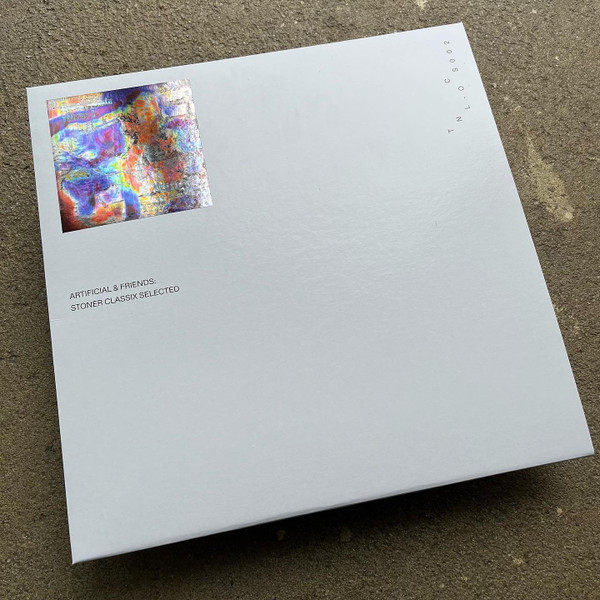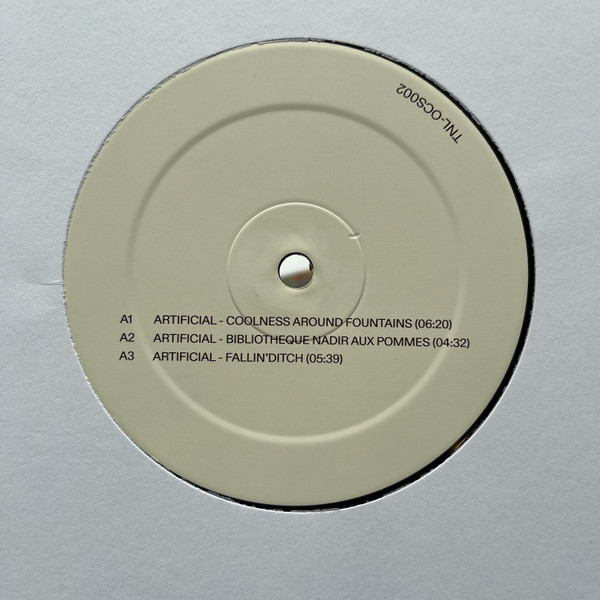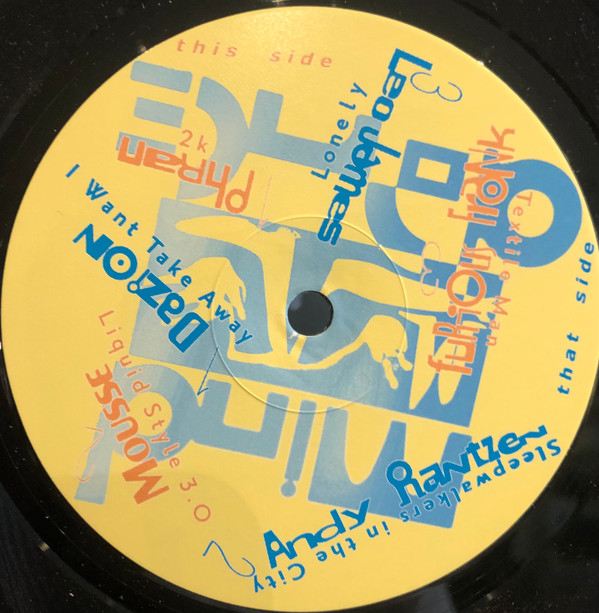ALL RIGHTS RESERVED © CG
Open today: 10:00 - 16:00
1 / 0
Artificial Dark Network
Stoner Classix Selected








Artists
Labels
Catno
TNL-OCS002
Formats
1x Vinyl 12" Mini-Album
Country
Release date
Jan 1, 2022
Genres
$48*
*Taxes included, shipping price excluded
New copy~
A1
Artificial - Coolness Around Fountains
6:20
A2
Artificial - Bibliotheque Nadir Aux Pommes
4:32
A3
Artificial - Fallin’ Ditch
5:39
B1
Artificial - OK Equipment
6:41
B2
Dark Network - Carpet Tirade
8:22
B3
Artificial - Middle Class Morality
7:27
Other items you may like:
A heady fusion of rock’s steely drive, cosmic trance, wiggy acid basslines and cavernous dub, Talk is at once rooted in the turn of the millennium while sounding utterly outside of space and time. A combination of coveted un- and self-released material, the record features a remix, specially commissioned by Betonska, from Naone.Jin Won Lee (이진원), otherwise known as Gazaebal, is a Korean producer and DJ whose sensual, spacious approach to electronica is rooted in his background as a sound engineer. Having begun his career in New York, in recording studios working with the likes of the Wu-Tang Clan and Janet Jackson, his expansive creative repertoire further includes media art and chart-topping K-pop. A member of Tacit Group, a collective creating algorithmic and audiovisual performances, Gazaebal is presently best known for ambient-adjacent soundscapes, yet in the halcyon late 1990s and early 2000s, he synergised a uniquely potent take on club music.The titular track was initially released in 1999 on the independent imprint dmstrax, established by Gazaebal’s agent and wife, Nine. First appearing on techno@kr, a compilation CD dedicated to Korean electronic musicians, ‘Talk’ is an hybrid, electro-punk anthem. Colliding sung-screeched Korean lyrics with heavy breakbeat, its abrasive textures are delivered with ultra-slick orchestration. Halfway through, the jittery breaks collapse, reprised by momentous four-to-the-floor. It’s this dichotomy between poise and power that characterises the record as Gazaebal flexes his ear for intricate melodies and rocketing build.Composed alongside Big Hit Productions founder and BTS songwriter Mr. "Hitman" Bang, the original version of 'And So On' was not available for re-release due to licensing difficulties. But thankfully the multitrack was well preserved. Utilising these components, Nawon Ha (AKA Korean-but-Netherlands-based artist Naone) re-imagines the song for Betonska. Remixed with her own hypnotic vocals, she inflects the track with mesmerising, multi-layered dimensions; a fractal, downtempo trance number that connects two generations of underground electronic musicians from South Korea.From the pulverising kickdrum of ‘Gilda’ to ‘Spiral's acidic dub fuzz, Talk moves between sharp crests, twists, and turns, enveloping driving 4/4 and shuffling half-time. Presented as a mix-friendly mini-album, the carefully selected 6 tracks are ideally tailored to DJ-level quality and loudness. As much suited to the psychedelic rave scene of yesteryear as they are to contemporary dancefloors, Gazaebal’s productions are defined by his idiosyncrasies. Melding the sheen of tight-production with a flagrant DIY spirit, his music assuages the high-commercialism of the 2000s, resulting in a sound that’s as definitely punchy as it is intoxicatingly precise.
U-Trax: ...Ambient braindance from ItalyComprising Marco Simioni, Matteo Mazreku, and Francesco Pio Nitti, Qualia are a group of Italian producers who have never met in person. Due to the covid pandemic, they had to colaborate in the cloud, resulting in some exquisite ambient braindance.Having previously released records on Detroit Underground and fellow Utrecht label 030303 between them, they arrive on U-Trax with their eponymous EP of four deep tracks taking influence from a range of genres, including acid-techno, ambient, noise, and beyond.Leading the release, 'Perception' brings beautiful strings, funky 808 drums and acid tones for a deep and moving opener. The track clearly reveals the inspiration Qualia got for this release from the early Gescom releases. Stretched across the A2 is the ambient bliss of 'VV Cephei A', which brings Boards of Canada-esque drones and tones.On the flip, the title track 'Qualia' brings a headsy dose of braindance to the mix, recalling the early experiments of Aphex Twin with merciless 303 squelches and distant reverberations. Closing track 'Until I Break Apart' leads with dark, moody strings before a pounding kick introduces a stark tempo shift before deep ambient atmospheres engulf the final minutes.
from the artist's bandcamp: ...7-track debut solo LP by Michael Zodorozny of Crash Course in Science // vinyl 300 copies, download & streamingOther Side is the first solo album of Michael Zodorozny, New York post-punk icon and founding member of Crash Course in Science. The side he shows on the album is a rougher and more personal one.The seven tracks, including a feisty remix by The Hacker, are dark and thrusting with an EBM and industrial feel. Home-made and self-invented instruments complete Michael's specific, extraordinary sound.Other Side was produced by Matia Simovich aka INHALT. Michael himself painted and designed the cover artwork.VIDEOConstant: youtu.be/ef1LJTNI_Ec14th Street Union Square Station: youtu.be/1Ht21vufxjE
U-Trax: ...U-TRAX presents some hi-energy old school electro and bass from Los Angeles turntablist and producer Nuklear Prophet, who follows up his recent EP on U-TRAX with the full-length album Prophecies 11:21.Formed of an eclectic and energetic collection of gems mined from his overwhelming archive, the album takes in genres such as Electro, Hip Hop, Footwork, Juke, and beyond.
Mind Dance return with the second volume in their ‘Mystic Minds’ VA series. Launched last year as a way to continue the strong collaborative nature of the electronic music underground, each installment will shine a light on local Australian talent and their cross-continental contemporaries.Continuing this mission with a new batch of friends, family and former label mates in tow, round two rallies six artists from home soil and overseas for another deep excursion into the vast expanses of dance music.From across the pond we have Dutch producer and Music From Memory regular Dazion who kicks off the VA with a wonky slice of rhythmic downtempo, and Phran, a Barcelona-based artist and member of IVAN - a duo alongside Ivy Barkakati - who puts his foot on the gas with a stomping techno cut.Closer to home we have Aussie dance veteran and the man behind Mind Dance’s last release, Andy Rantzen, deliver a tight bleep-soaked acid jam, followed by Leo James and Mousse flying the flag for Melbourne with twinkling IDM and laid-back vocal house, respectively. Finally label boss Furious Frank closes out proceedings with a downbeat percussive house number to usher in summer, if you’re in the Southern Hemisphere that is...
Follow us
Browse
HomeCatalogueLoginServices
Shipping & Returns PolicyTerms and conditions




